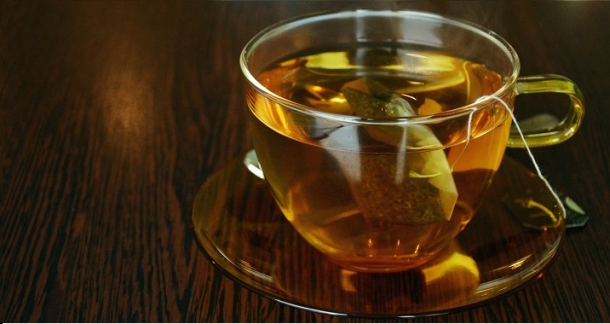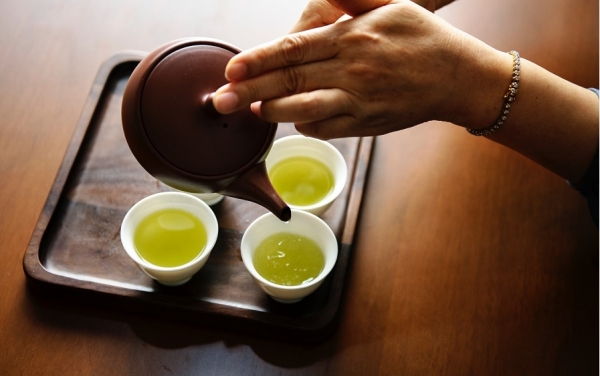9 Must-Have Benefits of Green Tea

By Gavin Deguara, ND, Grad Cert Nutr Med RMIT
When was the last time you had a cup of Green Tea?
This green beverage is one of the most widely consumed drinks on the planet. Over 600,000 tonnes are consumed worldwide each year, which equates to double the weight of the Empire State Building.

In Australia, 38% of people consume some form of tea daily, while coffee of course sits superior at 46%1.
Though for a time, Green tea was synonymous with sushi restaurants and Asian supermarkets, now it can be found on the shelves of supermarkets, convenience and health food stores, demonstrating its growing popularity and a staple for many.
Green tea is derived from the Camellia sinensis plant, as are Black tea, Oolong Tea and White Tea. Green tea leaves contain some impressive natural plant chemicals. Each year, new scientific publications reveal what this plant actually does for us. And though our knowledge is still in its infancy, what we do know is impressive to say the least.

Carb and Fat Blocker
Research shows that green tea can reduce the absorption of carbohydrates and fats from a meal. This is a similar function to the chitosan and white kidney beans extracts, which were popular on the Australian market a decade or more ago.
This is good news for anyone following a weight loss program or who has difficulty maintaining body weight. If less carbs and fats are absorbed from a meal, there are less calories to burn-off during the day. This means reaching a negative energy balance will be that little bit easier.
It's important to remember the jury's still out on just how potent these effects really are. However, you can't deny that it's an unexpected and interesting role for Green Tea, especially given that it's quite powerful at encouraging the metabolism to speed up.
A study published by Scientific Reports in 2015 ahowed that when green tea was consumed with a meal, carbohydrate digestion and absorption were reduced2. So if you want to emulate the results of this trial, sip on a cup of Green Tea or take a capsule or tablet during the meal.
It has been suggested that green tea polyphenols inhibit the activity of the digestive enzymes alpha-amylase and alpha-glucosidase3. If we digest less carbs, then we absorb less into our system.
Green Tea has also been studied for its fat-blocking ability. A powerful little polyphenol called EGCG has been shown to inhibit lipase, the enzyme responsible for the digestion and absorption of fats in our food4. Green Tea was actually shown 5 years earlier by the Journal of Nutritional Biochemistry that it could reduce fat digestion and emulsification6.
Coffee had a decent effect on lipase inhibition as well. This is definitely a plus for coffee drinkers—that and the fact that researchers say 3 to 5 cups per day is ideal for the prevention of a number of chronic diseases5.

Cholesterol Support
Given the role that green tea can play in decreasing fat absorption from a meal, it comes as little surprise that this super-leaf can also decrease serum LDL cholesterol levels. Researchers undertook an exhaustive review of green tea studies that included 17 clinical trials on the subject in order to draw this conclusion.
Regardless of dosage and the cholesterol level of the participant, green tea reduced LDL cholesterol by an average of 9.29mg/dl7. The trials lasted from 4 to 14 weeks, which is not that long when it comes to cholesterol changes.
It is conceivable that greater results could be achieved with a longer study duration. However, whichever way you look at it, this is great news for anyone wanting some LDL cholesterol assistance.
It’s worth a mention that pomegranate is a helpful natural cholesterol management agent, likely due to its high polyphenol content and free-radical scavenging activity, along with red rice yeast extract (always take with COQ10 or Ubiquinol) and bergamot8,9,10,11.
Weight Loss and Exercise Performance
All the way back in the last millennia, a piece of research showed green tea could boost 24-hour energy expenditure in humans12. The results were quite clear: the polyphenol EGCG boosts calorie-burning power.
Another paper was published 10 years later, indicating that green tea enhances abdominal fat loss in individuals who were exercising13. These slimming effects are believed to be due to stimulation of the sympathetic nervous system, which is how many natural fat burners work, and only partly due to caffeine 14.

A couple of other research papers were more recently published in the Journal of the International Society of Sports Nutrition, in 2014 and 2015. One of these papers indicated that at a dosage of 571mg decaffeinated green tea per day, standardised to 70% EGCG (400mg), fat oxidation rates increased by 24.9% over a 4 week period!
The researchers also noted that bodyfat levels decreased and distance covered in cycling increased by 10.9%. This shows some impressive effects for this plant. The second paper indicated that the effects of decaffeinated green tea varied significantly from person to person, though they used a smaller dosage, standardised to 170mg EGCG per day.
They reported no difference compared to placebo in their study, however, their dosages may not have been sufficient to cause marked physiological changes. These papers, however, highlight the importance of EGCG in green teas fat-burning effects.
Change Your Brain's Electrical Activity
L-theanine is an amino acid that was discovered in green tea leaves in 1949. It makes up around 1-2% of the dry weight of the leaf. Each cup of green tea is estimated to provide 25mg of this amino acid.
L-theanine is water soluble and therefore passes easily into the water when make a hot cuppa, ensuring that you get all the benefits it has to offer. Theanine is not proteinogenic, meaning that it is not incorporated into muscle or other tissue proteins. So what does it do then? Actually, quite a lot.

Human research has demonstrated that this amino acid has a calming effect. L-theanine can influence the electrical activity in our brains, promoting alpha brain wave activity15. This helps us to feel awake, yet relaxed, a feeling which is commonly associated with meditation and nature walks.
Research also indicates that theanine may have some benefits for anxiety sufferers. In this study, university students were split up into 2 groups: a high anxiety group and minimal anxiety group. Both groups received theanine and a placebo. Each group then underwent visual attention task and audio response test to assess their performance.
It was shown that the high anxiety group taking theanine showed improved alpha brain wave activity, reduced heart rate as well as improved test performance, while the low anxiety group showed no changes16. This study indicates that if you have high anxiety, theanine may help you perform better and feel more relaxed in doing so.
Before you start running out to stock up on theanine, it is important to point out that not all research has been so favourable. One paper published in 2004 showed no effect from 200mg L-Theanine, nor was there any drug effect from benzodiazepine17. However, this study used behavioural measures of anxiety, rather than subjective experiences and physical signs, like heart rate, blood pressure and EKG results.
Polyphenols: The Antioxidant Powerhouse
Green Tea is a rich source of a group of antioxidants called polyphenols. Polyphenols are actually an umbrella term that encompass a wide range of naturally occurring chemicals found in green tea—just like we would refer to the cars in a parking lots as cars, though we know that each car is different in some way.
The most abundant polyphenol antioxidant found in Green Tea is epigallocatechin-3-0-gallate, or EGCG18. Though EGCG has many other roles to play in the human body, it is also a powerful antioxidant. Antioxidants are important components of our diet, and help to maintain cellular health.
They are especially important when engaging in regular intense bouts of aerobic exercise. It is important to remember that approximately 3-10% of all oxygen utilised by tissues is converted to free-radicals, which need to be quenched by antioxidants19.
As there is such a marked increase in oxygen needs and therefore intake through the breath during aerobic exercise, it stands to reason that free-radical generation will be higher during this time. Anyone engaging in regular and intense aerobic exercise would ideally keep an eye on their antioxidant intake.
Anti-Viral and Anti-Bacterial Activity
In 2011 a randomised, double-blind, placebo-controlled trial of 200 healthcare workers was undertaken for a 5 month period in Japan. The treatment group received green tea antioxidants in the form of catechins, plus theanine.
The researchers measured the incidence of influenza infection, which was confirmed by laboratory analysis. As it turned out, the incidence of flue was only 4.1% in the treatment group, versus 13.1% in the placebo group20. This is indicated a protective effect of green tea against the influenza infection. It is believed that EGCG is responsible for the antiviral effects21.

A study of the effects of L-Theanine in a Polish rowing team demonstrated that 150mg of this amino acid, as compared to placebo, was able to module the immune system. Blood tests indicated that the TH1/TH2 lymphocyte was balanced by this natural compound. This indicates improved general immunological health and possible protection against overtraining syndrome22.
Furthermore, the catechins ECG, EGC and EGCG have displayed anti-bacterial effects as well23. This does not necessarily meant that green tea will destroy all harmful microbes and viruses and keep us clean and healthy for the rest of our lives, but it does indicate that with regards to infectious disease, green tea might just tip the scales enough in our favour to not get sick. And when you add other immune system supportive therapies that encompass lifestyle, diet and other supplements, our risk for infection can become significantly reduced.
Not Your Average Drink
Green Tea has some amazing effects attributed to it. This article presents only a small snippet of the research that is circulating out there on this miraculous herb. If you’re looking for a green tea tablet or capsule, try to find one that is standardised to EGCG or catechins.
Standardisation is a marker of the therapeutic quality of the product. This can be identified on the nutrition panel or ingredients listing of the product. Check out the image below for a company with good green tea ingredient transparency.

They are telling us about total catechin content found within the green tea, and the EGCG and caffeine content as well. I like to know at least the EGCG content. This type of information helps you find the best green tea for you. Remember, the quality and potency of each green tea plant differs.
This is due to variations in soil quality in which the green tea plant grows, nutrient availability, weather and other environmental factors, and even processing and manufacturing practices. The process of standardisation gives us some marker for the quality of the finished product. Green Tea has also been used an a natural anti-cancer compound, nootropic and preventer of some major chronic disease, such as type II diabetes and cardiovascular disease.
Does green tea contain caffeine? Unless it is decaffeinated, then yes. Even if the caffeine content is not stated on the packaging, green does contain caffeine. This might make one worry over the green tea vs coffee issue, however, the caffeine content of a standard cup of coffee is around 100mg, while a cup of green tea typically delivers about 20mg. Remember, green tea does contain theanine as well, which should help to reduce any side-effects that may be delivered by the caffeine content.
Importantly, try to incorporate Organic green tea bags of fresh brewed leaves into your daily diet if you can. It goes really well with sashimi or sushi, and as we’ve seen, it can be a great way to reduce the absorption of unneeded calories after a meal that we may have enjoyed just a little too much.
What are some of the experiences you've had with green tea? Feel free to leave a comment.
References
5. Cano-Marquina A et al. The impact of coffee on health. Maturitas 2013 Vol 75;1 p.7-21
8. Zarfeshany A et al. Potent health effects of pomegranate. Advanced Biomedical Research. 2014








